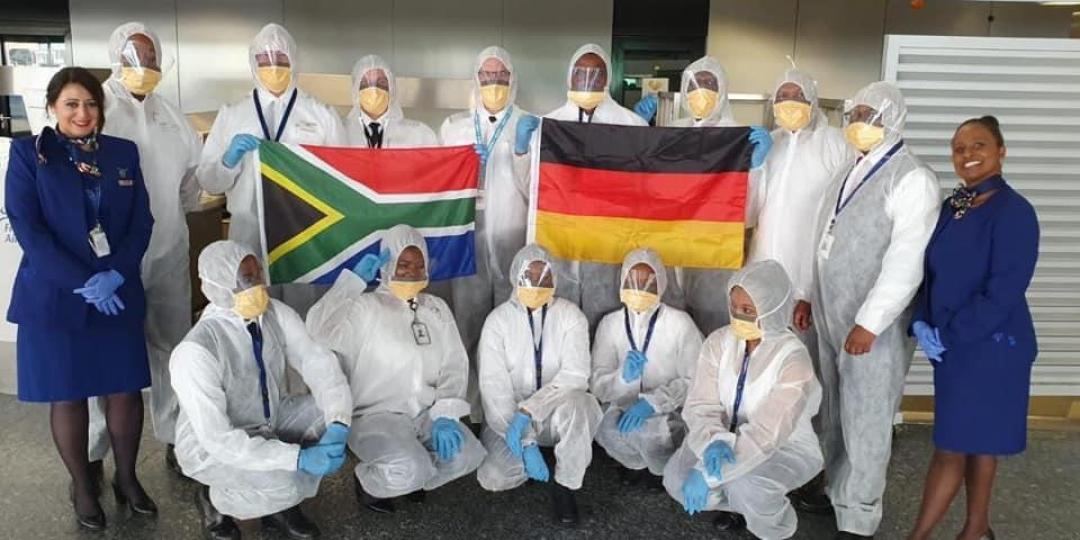A massive repatriation effort of more than 6 000 foreign nationals – stranded in the Western Cape during the lockdown – has taken place from Cape Town International Airport in the last three weeks.
According to the Western Cape Government, countries involved included Germany, the UK, The Netherlands, France, Belgium, Switzerland, the US, Canada and Brazil. The provincial repatriation effort was co-ordinated by the Provincial Disaster Management Centre along with several other partners, including the Department of Economic Development and Tourism and Wesgro, who ensured that each visitor was given a farewell note wishing them a safe trip home. “It was important that they had a good experience despite the lockdown, so that when we are ready to open our borders again, they will consider coming back,” commented Finance and Economic Opportunities MEC, David Maynier.
The last of 14 flights organised by the German government and operated by South African Airways departs from CTIA for Frankfurt at 22h00 tonight (April 23), concluding the repatriation of almost 4 000 Germans and 400 EU nationals from the Western Cape, according to German Consul General, Matthias Hansen.
He commended the joint effort by the Western Cape government, the City of Cape Town, Wesgro, National Government, Port Health Services, the SA Police Service, SAA, Airports Company SA and Cape Town Stadium. “Without their invaluable contribution, we would not have come as far as we are today."
Another 1 200 passengers were repatriated on five SAA flights to Germany from OR Tambo International Airport between April 3 and April 17.
The professionalism of the repatriation effort has been widely lauded by passengers on social media forums. German citizen, Dorothee Kreuser, praised in particular German Ambassador, Dr Martin Schäfer, for his regular letters to compatriots during the waiting period in lockdown. “They always had a calming effect on me!” she said.
Kreuser was due to return to Munich with Lufthansa on March 29 after visiting friends in Cape Town, but the flight was cancelled on March 25, shortly before South Africa’s lockdown. Stranded with her hosts for a nerve-racking three weeks, Kreuser eventually managed to fly home on one of the last repatriation flights earlier this week.
She has shared her experience with Tourism Update, documenting her trip on empty highways to the central pick-up point at Cape Town Stadium all the way to her arrival in Frankfurt.

Like all passengers, Kreuser had been issued with a certificate signed by the German Ambassador that allowed her hosts to transport her to the stadium. On arrival, Kreuser spent about an hour in a long queue, having her temperature taken, filling out health forms and going through passport checks. A German federal police officer was present during this process.

At the next point, Kreuser was assigned to a bus and received a packed lunch and a bottle of water. In an anteroom, chairs had been set-up 1.5m apart, where passengers waited while all 300 of them were processed.


When all were finally gathered, they were addressed by the German Consul General, before being loaded on to the buses. “Everything was very calm and orderly,” Kreuser remembers. “Apart from having to be patient, everything about the organsiation was near perfect.”

On the bus, only two people were allowed to sit in a row. At the airport, the luggage was unloaded first and examined by an officer with a sniffer dog.



Passengers were then allowed to disembark, identify their suitcases and go to check-in and through security, passport control and boarding, which all proceeded as normal, but with social distancing.

“The poor crew were wearing full-body protective suits and masks. They looked like aliens!,” recounts Kreuser. “Dinner was a bread roll with chicken or vegetarian and to drink we were offered water, coke or juice, tea or coffee. Amazing how many passengers asked about alcohol and were surpised that there was none! The flight was an hour shorter than planned because we were able to fly straight to Frankfurt, as there were no other planes in the sky and we could therefore use air corridors that are not normally free.”

In Frankfurt, passengers had to disembark in groups of 40 with three minutes between each group disembarking. “What was immediately noticeable was that the German border police officers we had to walk past did not wear face masks!”

Kreuser was eventually reunited with her husband, Christian, and sons, Felix and Max, who had driven all the way from Munich to collect her, normally a four-hour trip that took less than three hours because of a near empty Autobahn.























